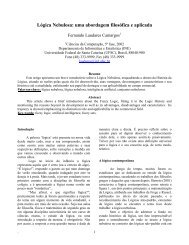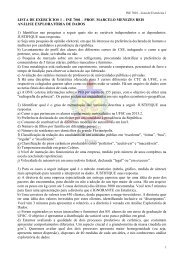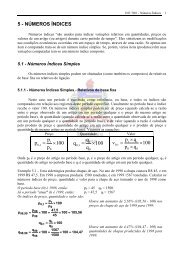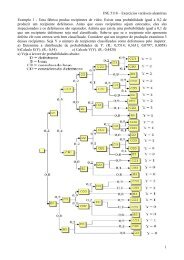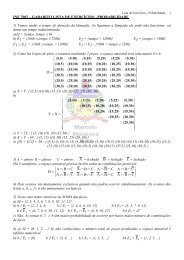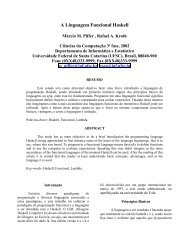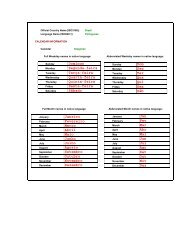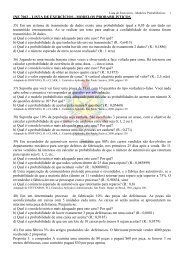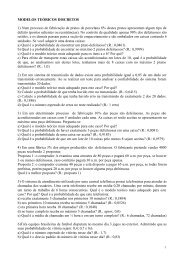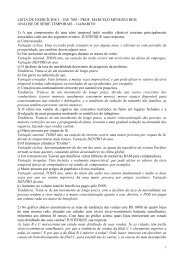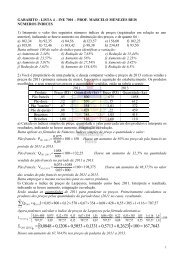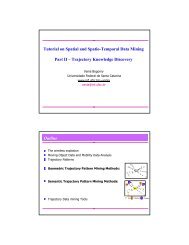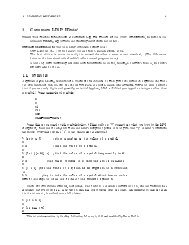- Page 1 and 2: De 15 a 17 de outubro de 2001 Flori
- Page 3 and 4: Sumário Apresentação............
- Page 5 and 6: Análise Ergonômica do Estado da A
- Page 7 and 8: de formidável coesão, denominado
- Page 9 and 10: Sociedade Brasileira de Computaçã
- Page 11: Fund. Educacional de Criciúma - FU
- Page 16 and 17: Tutorial Desenvolvimento de Interfa
- Page 19: IV Workshop sobre Fatores Humanos e
- Page 22 and 23: 2 Anais do IHC’2001 - IV Workshop
- Page 24 and 25: 4 Anais do IHC’2001 - IV Workshop
- Page 26 and 27: 6 Anais do IHC’2001 - IV Workshop
- Page 28 and 29: 8 Anais do IHC’2001 - IV Workshop
- Page 30 and 31: 10 Anais do IHC’2001 - IV Worksho
- Page 32 and 33: 12 Anais do IHC’2001 - IV Worksho
- Page 34 and 35: 14 Anais do IHC’2001 - IV Worksho
- Page 36 and 37: 16 Anais do IHC’2001 - IV Worksho
- Page 38 and 39: 18 Anais do IHC’2001 - IV Worksho
- Page 40 and 41: 20 Anais do IHC’2001 - IV Worksho
- Page 42 and 43: 22 Anais do IHC’2001 - IV Worksho
- Page 44 and 45: 24 Anais do IHC’2001 - IV Worksho
- Page 46 and 47: 26 Anais do IHC’2001 - IV Worksho
- Page 48 and 49: 28 Anais do IHC’2001 - IV Worksho
- Page 50 and 51: 30 Anais do IHC’2001 - IV Worksho
- Page 52 and 53: 32 Estrutura do discurso Anais do I
- Page 54 and 55: 34 Anais do IHC’2001 - IV Worksho
- Page 56 and 57: 36 Anais do IHC’2001 - IV Worksho
- Page 58 and 59: 38 Anais do IHC’2001 - IV Worksho
- Page 60 and 61: 40 Welcome + System message “Plea
- Page 62 and 63: 42 Anais do IHC’2001 - IV Worksho
- Page 64 and 65:
44 5. Concluding Remarks Anais do I
- Page 66 and 67:
46 Anais do IHC’2001 - IV Worksho
- Page 68 and 69:
48 Anais do IHC’2001 - IV Worksho
- Page 70 and 71:
50 Anais do IHC’2001 - IV Worksho
- Page 72 and 73:
52 Anais do IHC’2001 - IV Worksho
- Page 74 and 75:
54 Anais do IHC’2001 - IV Worksho
- Page 76 and 77:
56 Anais do IHC’2001 - IV Worksho
- Page 78 and 79:
58 Anais do IHC’2001 - IV Worksho
- Page 80 and 81:
60 Anais do IHC’2001 - IV Worksho
- Page 82 and 83:
62 Anais do IHC’2001 - IV Worksho
- Page 84 and 85:
64 Anais do IHC’2001 - IV Worksho
- Page 86 and 87:
66 Anais do IHC’2001 - IV Worksho
- Page 88 and 89:
68 market customers marketing resea
- Page 90 and 91:
70 Anais do IHC’2001 - IV Worksho
- Page 92 and 93:
72 Anais do IHC’2001 - IV Worksho
- Page 94 and 95:
74 Anais do IHC’2001 - IV Worksho
- Page 96 and 97:
76 Anais do IHC’2001 - IV Worksho
- Page 98 and 99:
78 Anais do IHC’2001 - IV Worksho
- Page 100 and 101:
80 Anais do IHC’2001 - IV Worksho
- Page 102 and 103:
82 Anais do IHC’2001 - IV Worksho
- Page 104 and 105:
84 Anais do IHC’2001 - IV Worksho
- Page 106 and 107:
86 2. O Ambiente TelEduc Anais do I
- Page 108 and 109:
88 Anais do IHC’2001 - IV Worksho
- Page 110 and 111:
90 Anais do IHC’2001 - IV Worksho
- Page 112 and 113:
92 Anais do IHC’2001 - IV Worksho
- Page 114 and 115:
94 Anais do IHC’2001 - IV Worksho
- Page 116 and 117:
96 Anais do IHC’2001 - IV Worksho
- Page 118 and 119:
98 Anais do IHC’2001 - IV Worksho
- Page 120 and 121:
100 Anais do IHC’2001 - IV Worksh
- Page 122 and 123:
102 Anais do IHC’2001 - IV Worksh
- Page 124 and 125:
104 Anais do IHC’2001 - IV Worksh
- Page 126 and 127:
106 Anais do IHC’2001 - IV Worksh
- Page 128 and 129:
108 Anais do IHC’2001 - IV Worksh
- Page 130 and 131:
110 Anais do IHC’2001 - IV Worksh
- Page 132 and 133:
112 Corpo Anais do IHC’2001 - IV
- Page 134 and 135:
114 Anais do IHC’2001 - IV Worksh
- Page 136 and 137:
116 Anais do IHC’2001 - IV Worksh
- Page 138 and 139:
118 Anais do IHC’2001 - IV Worksh
- Page 140 and 141:
120 Anais do IHC’2001 - IV Worksh
- Page 142 and 143:
122 Anais do IHC’2001 - IV Worksh
- Page 144 and 145:
124 Anais do IHC’2001 - IV Worksh
- Page 146 and 147:
126 Anais do IHC’2001 - IV Worksh
- Page 148 and 149:
128 Anais do IHC’2001 - IV Worksh
- Page 150 and 151:
130 Anais do IHC’2001 - IV Worksh
- Page 152 and 153:
132 Anais do IHC’2001 - IV Worksh
- Page 154 and 155:
134 Anais do IHC’2001 - IV Worksh
- Page 156 and 157:
136 Anais do IHC’2001 - IV Worksh
- Page 158 and 159:
138 Anais do IHC’2001 - IV Worksh
- Page 160 and 161:
140 Anais do IHC’2001 - IV Worksh
- Page 162 and 163:
142 Anais do IHC’2001 - IV Worksh
- Page 164 and 165:
144 Anais do IHC’2001 - IV Worksh
- Page 166 and 167:
146 Anais do IHC’2001 - IV Worksh
- Page 168 and 169:
148 Anais do IHC’2001 - IV Worksh
- Page 170 and 171:
150 Anais do IHC’2001 - IV Worksh
- Page 172 and 173:
152 What happened? Falha: O usuári
- Page 174 and 175:
154 Anais do IHC’2001 - IV Worksh
- Page 176 and 177:
156 Anais do IHC’2001 - IV Worksh
- Page 178 and 179:
158 Anais do IHC’2001 - IV Worksh
- Page 180 and 181:
160 Anais do IHC’2001 - IV Worksh
- Page 182 and 183:
162 Anais do IHC’2001 - IV Worksh
- Page 184 and 185:
164 A) Fase de Análise de Alternat
- Page 186 and 187:
166 Título Modelo de Comunicaçõe
- Page 188 and 189:
168 Anais do IHC’2001 - IV Worksh
- Page 190 and 191:
170 Anais do IHC’2001 - IV Worksh
- Page 192 and 193:
172 Anais do IHC’2001 - IV Worksh
- Page 194 and 195:
174 Anais do IHC’2001 - IV Worksh
- Page 196 and 197:
176 Anais do IHC’2001 - IV Worksh
- Page 198 and 199:
178 Anais do IHC’2001 - IV Worksh
- Page 200 and 201:
180 Anais do IHC’2001 - IV Worksh
- Page 202 and 203:
182 Anais do IHC’2001 - IV Worksh
- Page 204 and 205:
184 Anais do IHC’2001 - IV Worksh
- Page 206 and 207:
186 Anais do IHC’2001 - IV Worksh
- Page 208 and 209:
188 Anais do IHC’2001 - IV Worksh
- Page 210 and 211:
190 5. Evaluation Anais do IHC’20
- Page 212 and 213:
192 7. Ongoing and future work Anai
- Page 214 and 215:
194 Anais do IHC’2001 - IV Worksh
- Page 216 and 217:
196 Anais do IHC’2001 - IV Worksh
- Page 218 and 219:
198 Anais do IHC’2001 - IV Worksh
- Page 220 and 221:
A B C 200 Anais do IHC’2001 - IV
- Page 222 and 223:
202 Anais do IHC’2001 - IV Worksh
- Page 224 and 225:
204 Anais do IHC’2001 - IV Worksh
- Page 226 and 227:
206 Anais do IHC’2001 - IV Worksh
- Page 228 and 229:
208 2. Signos X Modelo cultural Ana
- Page 230 and 231:
210 Anais do IHC’2001 - IV Worksh
- Page 232 and 233:
212 Anais do IHC’2001 - IV Worksh
- Page 234 and 235:
214 Anais do IHC’2001 - IV Worksh
- Page 236 and 237:
216 Anais do IHC’2001 - IV Worksh
- Page 238 and 239:
218 Anais do IHC’2001 - IV Worksh
- Page 240 and 241:
220 Anais do IHC’2001 - IV Worksh
- Page 242 and 243:
222 Anais do IHC’2001 - IV Worksh
- Page 244 and 245:
224 Anais do IHC’2001 - IV Worksh
- Page 246 and 247:
226 Anais do IHC’2001 - IV Worksh
- Page 248 and 249:
228 Anais do IHC’2001 - IV Worksh
- Page 250 and 251:
230 Anais do IHC’2001 - IV Worksh
- Page 252 and 253:
232 Anais do IHC’2001 - IV Worksh
- Page 254 and 255:
234 Anais do IHC’2001 - IV Worksh
- Page 256 and 257:
236 Anais do IHC’2001 - IV Worksh
- Page 258 and 259:
238 Anais do IHC’2001 - IV Worksh
- Page 260 and 261:
240 Anais do IHC’2001 - IV Worksh
- Page 262 and 263:
242 Anais do IHC’2001 - IV Worksh
- Page 264 and 265:
244 Anais do IHC’2001 - IV Worksh
- Page 266 and 267:
246 Anais do IHC’2001 - IV Worksh
- Page 268 and 269:
248 Anais do IHC’2001 - IV Worksh
- Page 270 and 271:
250 Anais do IHC’2001 - IV Worksh
- Page 272 and 273:
252 Anais do IHC’2001 - IV Worksh
- Page 274 and 275:
254 Anais do IHC’2001 - IV Worksh
- Page 276 and 277:
256 Anais do IHC’2001 - IV Worksh
- Page 278 and 279:
258 Anais do IHC’2001 - IV Worksh
- Page 280 and 281:
260 Anais do IHC’2001 - IV Worksh
- Page 282 and 283:
262 Anais do IHC’2001 - IV Worksh
- Page 284 and 285:
264 Anais do IHC’2001 - IV Worksh
- Page 286 and 287:
266 Anais do IHC’2001 - IV Worksh
- Page 288 and 289:
268 Anais do IHC’2001 - IV Worksh
- Page 291 and 292:
Anais do IHC’2001 - IV Workshop s
- Page 293 and 294:
Anais do IHC’2001 - IV Workshop s
- Page 295 and 296:
Anais do IHC’2001 - IV Workshop s
- Page 297 and 298:
Anais do IHC’2001 - IV Workshop s
- Page 299 and 300:
Anais do IHC’2001 - IV Workshop s
- Page 301 and 302:
Anais do IHC’2001 - IV Workshop s
- Page 303 and 304:
Anais do IHC’2001 - IV Workshop s
- Page 305 and 306:
Anais do IHC’2001 - IV Workshop s
- Page 307 and 308:
Anais do IHC’2001 - IV Workshop s
- Page 309 and 310:
Anais do IHC’2001 - IV Workshop s
- Page 311 and 312:
Anais do IHC’2001 - IV Workshop s
- Page 313 and 314:
Anais do IHC’2001 - IV Workshop s
- Page 315 and 316:
Anais do IHC’2001 - IV Workshop s
- Page 317 and 318:
Anais do IHC’2001 - IV Workshop s
- Page 319 and 320:
Anais do IHC’2001 - IV Workshop s
- Page 321 and 322:
Anais do IHC’2001 - IV Workshop s
- Page 323 and 324:
Anais do IHC’2001 - IV Workshop s
- Page 325 and 326:
Anais do IHC’2001 - IV Workshop s
- Page 327 and 328:
Anais do IHC’2001 - IV Workshop s
- Page 329 and 330:
Anais do IHC’2001 - IV Workshop s
- Page 331 and 332:
Anais do IHC’2001 - IV Workshop s
- Page 333 and 334:
Anais do IHC’2001 - IV Workshop s
- Page 335:
Anais do IHC’2001 - IV Workshop s



